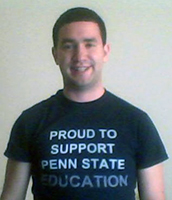
- Campuses :
- Twin Cities
- Crookston
- Duluth
- Morris
- Rochester
- Other Locations

center for writing
writing.umn.edu
writing.umn.edu
Center for Writing alumni—Brad Serber
11 Questions for Center for Writing Alums
 Your name: Brad Serber
Your name: Brad Serber- Your email: serberus@psu.edu
- When did you work with us? I worked in Student Writing Support from 2008 to 2010.
- What was your role? writing consultant, front desk/computer lab attendant, teaching/research assistant, Commanding English writing consultant
- What education and/or occupation(s) have you pursued since working with us? I completed my M.A. at Texas A&M earlier this year, and I have just started a four-year Ph.D. in Communication Arts & Sciences at Penn State University. While at Texas A&M, I taught three classes as instructor of record, and I am currently on a one-year research fellowship. I plan to resume teaching next summer.
Reflections on your center experience:
- Did your work with us influence your educational or occupational choices? If so, how? Working at the Center for Writing has definitely influenced my pedagogy, and I am very grateful for the experience and support I received there. The pedagogy seminar helped me develop my teaching philosophy, and the practice I received working as a consultant and as a teaching assistant for Commanding English helped prepare me for classroom experience in ways that many of my colleagues wished they could have had before they started teaching.
- What are the most significant abilities, values, or skills that you developed in your work with us? There are three things that stand out in my mind:
1. Prioritize: I'm a perfectionist in some ways that both help and hinder my writing and teaching. The good side of being a perfectionist is that I am usually proud of my work when it's finished (and others usually are, too). The bad side is that I can sit for hours in front of a computer screen staring at a single sentence (or, worse yet, word). Many of my students, whether at C4W or in classes, are also perfectionists. Learning to prioritize higher-order and lower-order concerns in my writing and teaching has helped me stay focused, relax, and give better feedback.
2. Understand Writing as a Process, and Learn to Adapt Your Process When Necessary: Whether through nature or nurture, I learned to become a decent one-draft writer. Decent, but not necessarily good. This strategy served me well for standardized tests, undergraduate deadlines, and other quick assignments, but it no longer works for my research or teaching. In my efforts to condition myself to be a multi-draft writer, I have found that my writing is much better when I take my time, take risks, and let go of things that aren't quite working. Furthermore, as many of my students are multi-draft writers (whether consciously or unconsciously), recognizing differences in style can help people overcome some of writing's most difficult obstacles.
3. Find Your "Voice": The more I teach writing and argumentation, the more I learn how much each are bound up with questions of identity: What do I write about? What do I say? How do I express it? What if I haven't made up my mind about a topic? How do I balance others' ideas with my own? How do I defend my ideas against those who might disagree with me?
In my mind, the relationship between identity and writing is simultaneously its greatest blessing and its greatest curse. Writing helps us recognize who we are and how we engage world around us; at the same time, identity and expression are often uncomfortable, difficult, and downright frustrating. Furthermore, as we recently discussed in one of my grad seminars, "voice" is a horribly abstract concept (one that often devolves into other abstractions, such as ethos, style, and persona), but one that writers and critics can't seem to avoid. Learning to develop your own voice is not an easy task, and helping others find theirs can be even more challenging; nevertheless, as "voice" is connected to identity and agency, finding it can be one of the most liberating, enjoyable, and worthwhile endeavors. - In your personal and professional life today, how do you find yourself using what you learned from working with us? The skills and lessons that I learned at C4W have followed me every day of my academic career. Whether I am developing my writing style, teaching in the classroom, presenting at a conference, or even managing interpersonal relationships, C4W is in the back of my head.
- Anything else you want to tell us and your fellow Center alums? First, I just want to say thank you. I was very fortunate to interact with many great people during the two years that I worked at C4W, and your support, advice, and general goodness made my experience not only a springboard for my career but truly a great place to work. As I look back on my time with all of you, the phrase that I find myself using is that we created an atmosphere of "serious playfulness." We were committed to working hard, providing quality services to our students, and developing our own practices, but we made sure to have fun, get to know each other, and not take life too seriously. I loved going to work every day, and I wonder how many people can honestly say they have such a good situation.
Second, as I have moved on to two different schools (each about 1200 miles away from the Twin Cities), I have found myself losing touch with many people. To some extent, I recognize that distance, time, and new commitments make losing touch inevitable, but some of my biggest regrets have been not keeping in contact with some of you. The C4W and its alumni are a great community, and I miss it a lot. I'll try to work on that, and I would love to hear from you, too.

